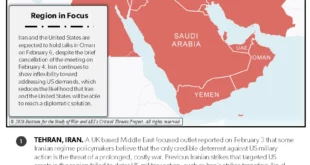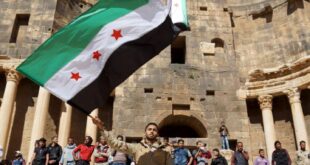Troops rescue Western hostagesBAGHDAD (AP) — The American military spokesman said on Thursday that major violence in Iraq was confined to just three of Iraq’s 18 provinces, but the fighting raged on with at least 56 more Iraqis reported killed in shadowy execution-style slayings, bombings and gunbattles.
For the third day running, insurgent forces hit a major police and jail facility, this time a suicide car bomber in central Baghdad.
The attacker detonated his explosives at the entrance to the interior ministry major crimes unit in the Karradah district, killing 10 civilians and 15 policemen stationed there, authorities said.
As insurgent forces raised the stakes with the attacks, the US military announced late Thursday that it was in the second day of an operation with Iraqi soldiers “to disrupt anti-Iraqi forces and to find and destroy terrorist caches in the Abu Ghraib area west of Baghdad.
The mililatry statement said 1,400 personnel were involved in the operation — termed Northern Lights — and had captured “two persons of high-value interest and 16 suspected terrorists.” Two large weapons caches also were discovered, the military said.
Abu Ghraib is the location where US and British forces stormed a house Thursday morning and freed three Christian peace activists held hostage since November 26.
The interior ministry, whose facilities and police have come under massive attacks three days running, is a predominantly Shiite organisation and heavily infiltrated by members of various Shiite militias.
The unit targeted Thursday investigates major crimes and its jail held about 20 suspected insurgents, police Lt. Col. Falah Mohammadawi said.
In a rundown of the week’s military activity, Maj. Gen. Rick Lynch, the US military spokesman, told reporters Thursday that most Iraqi violence was focused in three central provinces, including Baghdad.
“There is not widespread violence across Iraq. There is not. Seventy-five per cent of the attacks still take place in Baghdad, Anbar, or Salaheddin [provinces]. And in the other 15 provinces, they all averaged less than six attacks a day, and 12 of those provinces averaged less than two attacks a day.” He said attacks nationwide were averaging 75 a day, a level that has been generally sustained since last August.
The three provinces he cited, however, are home to about nine million people, according to the Iraqi ministry of planning and development, and make up a third of the country’s population of 27 million.
Lynch’s list omitted Diyala province that stretches north and east of Baghdad to the Iranian border and is home to nearly 1.5 million people.
It was the scene Tuesday of the first of the series of attacks on police facilities, when 100 insurgents stormed a jail and freed 33 prisoners, 18 of their own men who were captured just two days earlier.
The attack killed 20 police and wrecked the jail, police station and courthouse in Muqdadiyah, a town northeast of Baghdad and about an hour’s drive from the Iranian frontier. Ten insurgents were killed.
As Iraqi soldiers and police have begun patrolling more territory, US forces have become less visible in many areas in the country and less easy to target. Also, the nature of the violence in the country has shifted from assaults on American troops to battles rooted in sectarian conflict between Sunni and Shiite Muslims.
Heavy death tolls continue on most days now in the provinces where Shiites and Sunnis live near one another, including those where Lynch said most of the violence was taking place.
Well more than 1,000 people have died violently in the country, and mainly in and around Baghdad, in the month since an important Shiite shrine was destroyed by bombers in Samarra, a major city in Salaheddin province.
The sectarian-rooted deaths since then have been running at dozens a day, with the bodies well more than 100 of the victims dumped after being shot execution-style, hands bound and bearing signs of torture found.
Lynch acknowledged a spike in “ethnic-sectarian incidents,” saying that civilian casualties increased 75 per cent during the period of March 11-17, compared with the previous week. In Baghdad alone, he said, the US command recorded 58 incidents involving 134 dead during that period.
In addition to the attack on the police facility in central Baghdad on Thursday, 31 other deaths were reported, including 15 more bodies found scattered through Baghdad and Fallujah, a former insurgent stronghold in Anbar province.
A second car bomb hit a market area outside a Shiite mosque in the mixed Shiite-Sunni neighbourhood of Shurta in southwest Baghdad. At least six people were killed and more than 20 wounded, many of them children, police said.
Roadside bombs targeting police patrols killed four — two policemen and two bystanders — in Baghdad and at least one policeman in Iskandariyah, 50 kilometres south of Baghdad. Police said dozens were wounded.
Two more policemen were killed and two were wounded when gunmen ambushed their convoy in north Baghdad, an attack that police said was an aborted attempt to free detainees who were being transferred to the northern city of Mosul.
Elsewhere in the capital, two police were killed in gunbattles with insurgents, and two civilians — a private contractor and power plant employee — were gunned down in drive-by shootings.
 Eurasia Press & News
Eurasia Press & News



